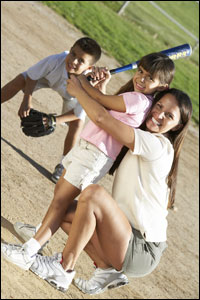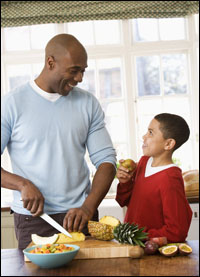Middle Childhood: Learn Some Positive Parenting Tips
 Discover (or rediscover) positive ways that you can help your child learn and develop.
Discover (or rediscover) positive ways that you can help your child learn and develop.This is the third in a series of articles about positive parenting tips.
Your child is heading back to school. As she grows, her needs may change. Discover positive ways to help the development of your 6- to 8-year old or 9- to 11-year old.
Middle Childhood (6–8 years old)

Middle childhood brings many changes to a child's life. By this time, children can dress themselves, catch a ball more easily with only their hands, and tie their shoes. Developing independence from family becomes more important now. Events such as starting school bring children this age into regular contact with the larger world. Friendships become more and more important. Physical, social, and mental skills develop rapidly at this time. This is a critical time for children to develop confidence in all areas of life, such as through friends, schoolwork, and sports.
Positive Parenting Tips – Middle Childhood (6 – 8 years old)
- Show affection for your child. Recognize her accomplishments.
- Help your child develop a sense of responsibility—ask him to help with household tasks, such as setting the table.
- Talk with your child about school, friends, and things she looks forward to in the future.
- Talk with your child about respecting others. Encourage him to help people in need.
- Help your child set her own achievable goals—she'll learn to take pride in herself and rely less on approval or reward from others.
- Make clear rules and stick to them, such as how long your child can watch TV or when he has to go to bed. Be clear about what behavior is okay and what is not okay.
- Help your child learn patience by letting others go first or by finishing a task before going out to play. Encourage him to think about possible consequences before acting.
- Do fun things together as a family, such as playing games, reading, and going to events in your community.
- Get involved with your child's school. Meet the teachers and staff to understand the learning goals and how you and the school can work together to help your child do well.
- Continue reading to your child. As your child learns to read, take turns reading to each other.
- Use discipline to guide and protect your child, rather than punishment to make her feel badly about herself.
- Support your child in taking on new challenges. Encourage him to solve problems, such as a disagreement with another child, on his own.
More information is available in English or en Español.
Middle Childhood (9–11 years old)

Your child's growing independence from the family and interest in friends might be obvious by now. Healthy friendships are very important to your child's development, but peer pressure can become strong during this time. Children who feel good about themselves are more able to resist negative peer pressure and make better choices for themselves. This is an important time for children to gain a sense of responsibility along with their growing independence. Also, physical changes of puberty might be showing by now, especially for girls. Another big change children need to prepare for during this time is starting middle or junior high school. However, you can help your child become independent, while building his or her sense of responsibility and self-confidence at the same time.
Positive Parenting Tips – Middle Childhood (9 –11 years old)
Spend time with your child. Talk with her about her friends, her accomplishments, and what challenges she will face.
- Be involved with your child's school. Go to school events; meet your child's teachers.
- Encourage your child to join school and community groups, such as a team sport, or to take advantage of volunteer opportunities.
- Help your child develop his own sense of right and wrong. Talk with him about risky things friends may pressure him to do, like smoking or dangerous physical dares.
- Help your child develop a sense of responsibility—involve your child in household tasks. Talk to your child about saving and spending money wisely.
- Meet the families of your child's friends.
- Talk with your child about respecting others. Encourage your child to help people in need. Talk with him or her about what to do when others are not kind or are disrespectful.
- Help your child set his own goals. Encourage him to think about skills and abilities he would like to have and about how to develop them.
- Make clear rules and stick to them. Talk to your child about what you expect from her when no adults are supervising. If you provide reasons for rules, it will help your child to know what to do in those situations.
- Use discipline to guide and protect your child, instead of punishment to make him feel badly about himself.
- Talk with your child about the normal physical and emotional changes of puberty.
- Encourage your child to read every day. Talk with her about her homework.
- Be affectionate and honest with your child, and do things together as a family.
More information is available in English or en Español.
More Information
- Learn more about child development.
- Listen to a podcast, Positive Parenting Tips: Middle Childhood (
 5:47 minutes).
5:47 minutes). - Check out CDC's information on Safe and Healthy Kids and Teens.
- Explore additional CDC features on positive parenting tips: Infants & Toddlers, Preschoolers and Pre-teens and Teenagers.
Additional CDC Resources
- Child Passenger Safety
- Playground Injuries
- Poison Prevention Tips
- Prevent Child Maltreatment
- Water-related Injuries
- Podcasts
- Protecting Yourself and Your Family Against Poisonings (
 2:59 minutes)
2:59 minutes) - Staying Safe On the Road (
 4:55 minutes)
4:55 minutes) - Staying Safe On the Water (
 3:45 minutes)
3:45 minutes) - Staying Safe In the Water (
 5:38 minutes)
5:38 minutes)
- Protecting Yourself and Your Family Against Poisonings (

